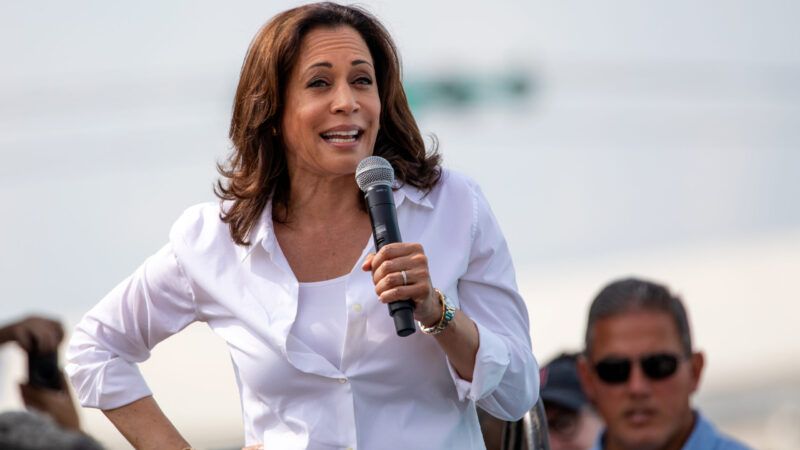The Dumb and Dumber of Kamala's 'Greedflation' Narrative
The American economy is robustly competitive. The federal government could just mess it up.

Democratic presidential candidate Kamala Harris' new call to regulate food prices and block mergers has drawn enormous flak from economists, given the poor track record of price controls. Democrats think they can make political headway with a "greedflation" narrative, blaming rising prices on business profit-seeking.
There are both disreputable and respectable versions of this narrative—dumb and dumber, if you will—but they both run into the same problem: the evidence is against them. The dumber version, the one no economists endorse, says corporations got especially greedy, which made prices go up. If this were true, we could explain surges and drops in inflation as an effect of surges and drops in corporate greed. Since greed is limitless, prices would never drop and this is clearly at odds with observable facts and history.
The merely dumb, or at least more respectable, version says that the American economy has become more monopolistic over time, and that is why businesses have been able to raise prices more. Consumers are the victims of a lack of competition. Harris nodded toward this explanation in her speech announcing the new policy, perhaps in response to early criticisms from economists.
Of course, it is absurd to believe that monopolies have developed so rapidly in the last three years that this caused the surge in inflation.
Putting that aside, while few economists would endorse price controls as a solution to insufficient competition—except for true natural monopolies—some would endorse blocking mergers through antitrust policy. The epicenter of the new optimism about antitrust is probably the Stigler Center at the University of Chicago. "The fact that you have prominent people at Chicago calling for antitrust enforcement is changing the game," says law professor and The New York Times writer Tim Wu.
There aren't many good case studies of successful antitrust enforcement. Indeed, mergers often create more competition, as when the recent T-Mobile/Sprint merger created a successful wireless network to compete with AT&T and Verizon. Evidence shows the merger raised wireless speeds and expanded 5G availability. Fortunately, the Obama administration did not block the merger (although they did delay it).
But one stylized fact seems to have taken hold of newly pro-antitrust economists: rising markups in the U.S. economy. Markups are the difference between the marginal cost to produce a good or service and the price at which it's sold. A search for "markups" on the Stigler Center's ProMarket blog yields dozens of hits. "Markups have increased because firms became better at creating product differentiation and erecting barriers to entry," Chicago economist Luigi Zingales hypothesized in 2016.
Sounds plausible. But two new papers show that the rise in markups has nothing to do with diminishing competition. The first, a working paper published by the Federal Reserve Bank of St. Louis, finds that markups are higher in the service sector, and consumers are shifting their consumption from manufactured goods to services. Therefore, the average markup in the economy is increasing.
The second, a working paper published by the National Bureau of Economic Research, finds that markups have increased because consumers have become less price-sensitive, a mechanism also explored in the first paper. In other words, consumers have been shopping around less to find lower prices, so markups have risen. But it hasn't happened because firms have taken advantage of inattentive consumers to raise prices; it's just that costs have fallen faster than prices, resulting in higher markups.
The two papers have discovered complementary explanations for the rise in U.S. markups. Wealthier households consume proportionately fewer manufactured goods and more services and are also less price-sensitive. As Americans in general have become wealthier, we have all consumed more services and have become less price-sensitive.
This makes sense. As we become wealthier, the cost of our time rises. We're more likely to quickly buy what we need without comparing prices at multiple locations. We're also more likely to buy higher-quality versions of the same item. When it comes to food, this is definitely happening; just stroll down the grocery aisles and look at the plethora of "fair-trade," "humane," and organic certifications.
These results should hearten us that the U.S. economy isn't rigged against the consumer.
Indeed, where we do see market power, it's usually not created by really big companies. A rural hardware store has market power if the next hardware store is a long drive away. Public services like public schools and water and sewer systems have immense market power.
Moreover, big business isn't necessarily bad. For example, Walmart, Costco, and Amazon have driven down retail prices by competing with each other.
Economists agree that excessive fiscal and monetary stimulus is the primary cause of inflation, not business profit-seeking. But even the best case for the Biden administration's aggressive antitrust policies, which Harris is promising to ratchet up, has just run into a wall of contrary evidence.
The American economy is robustly competitive. The federal government could just mess it up with a "big is bad" antitrust policy, which would be dumb, and price controls, which would be dumber.


Show Comments (29)